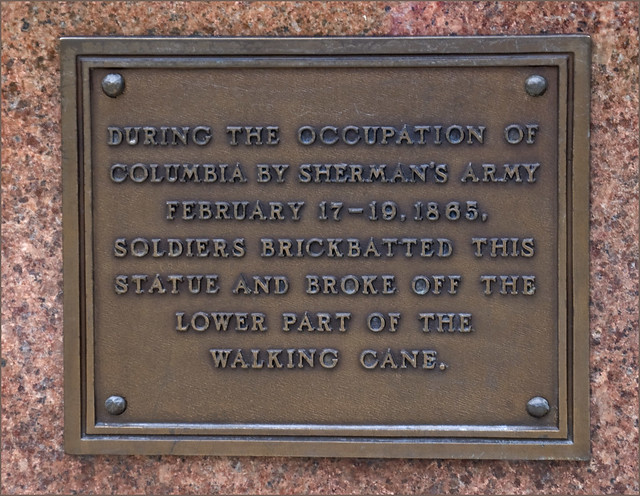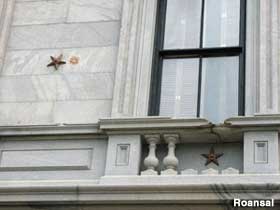150 years ago today, Willie T. Sherman's troops occupied Columbia.
Fires broke out almost immediately. Louisa McCord made of point of asking Union General Oliver Otis Howard (after whom Howard University was later named) for his assistance in getting his soldiers to stop their arson. Howard assured her that his soldiers were not setting the fires, but that abandoned cotton that Confederate General Wade Hampton's men has set ablaze as they left town was the culprit.
As McCord and Howard were talking, one of McCord's slaves informed McCord that a fire had broken out in a closed back room of the house. On investigation, McCord and Howard found the door latched. McCord asked Howard, "General, isn't it strange that cotton bolls could blow into a closed room, latch the door behind them and set fire to the house? Most strange."
Sherman's soldiers vandalized the statue of George Washington, by breaking the cane he was holding.

South Carolina declined to repair the vandalism but to remember the event by placing a plaque on the still-damaged statue's pedestal:

Fires broke out almost immediately. Louisa McCord made of point of asking Union General Oliver Otis Howard (after whom Howard University was later named) for his assistance in getting his soldiers to stop their arson. Howard assured her that his soldiers were not setting the fires, but that abandoned cotton that Confederate General Wade Hampton's men has set ablaze as they left town was the culprit.
As McCord and Howard were talking, one of McCord's slaves informed McCord that a fire had broken out in a closed back room of the house. On investigation, McCord and Howard found the door latched. McCord asked Howard, "General, isn't it strange that cotton bolls could blow into a closed room, latch the door behind them and set fire to the house? Most strange."
Sherman's soldiers vandalized the statue of George Washington, by breaking the cane he was holding.
South Carolina declined to repair the vandalism but to remember the event by placing a plaque on the still-damaged statue's pedestal:

Colonel Oscar Jackson, of the 63rd Ohio Infantry, noted in his diary on February 13:General William T. Sherman said:“The amount of plundering, burning, and stealing done by our own army makes me ashamed of it. I would quit the service if I could for I fear we are drifting towards vandalism. Thus you and I and every commander must go through the war justly chargeable for our crimes.”
In 1865, one of Sherman's Michigan soldiers wrote,“Going through South Carolina we are burning nearly all buildings that will burn.”
“You never heard of a more desolate country. I do not believe you can find food enough in S.C. to keep a dozen chickens over winter. I saw property destroyed until I was perfectly sick of it…and if this thing had been North I would bushwack until every man was dead or I was. If such scenes should be enacted through Michigan, I would never live as long as one of the invading army did. I do not blame the South and I shall not if they go to guerilla warfare.”
Hat-tip to Seebell for reminding me of the anniversary.New York war correspondent said:“I hazard nothing in saying that three-fifths of the personal property of the counties we passed through were taken by Sherman’s army. As for wholesale burnings, pillage, and devastation committed in South Carolina, magnify all I have said of Georgia some fifty-fold, and then throw in an occasional murder…and you have a pretty good idea of the whole thing.”
Last edited:




